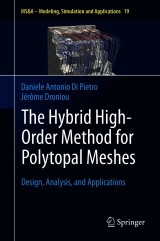Details

The Hybrid High-Order Method for Polytopal Meshes
Design, Analysis, and ApplicationsMS&A, Band 19
|
CHF 165.50 |
|
| Verlag: | Springer |
| Format: | |
| Veröffentl.: | 03.04.2020 |
| ISBN/EAN: | 9783030372033 |
| Sprache: | englisch |
Dieses eBook enthält ein Wasserzeichen.
Beschreibungen
<p></p><p>This monograph provides an introduction to the design and analysis of Hybrid High-Order methods for diffusive problems, along with a panel of applications to advanced models in computational mechanics. Hybrid High-Order methods are new-generation numerical methods for partial differential equations with features that set them apart from traditional ones. These include: the support of polytopal meshes, including non-star-shaped elements and hanging nodes; the possibility of having arbitrary approximation orders in any space dimension; an enhanced compliance with the physics; and a reduced computational cost thanks to compact stencil and static condensation.</p>
The first part of the monograph lays the foundations of the method, considering linear scalar second-order models, including scalar diffusion – possibly heterogeneous and anisotropic – and diffusion-advection-reaction. The second part addresses applications to more complex models from the engineering sciences: non-linear Leray-Lions problems, elasticity, and incompressible fluid flows. This book is primarily intended for graduate students and researchers in applied mathematics and numerical analysis, who will find here valuable analysis tools of general scope. <p></p><br><p></p>
The first part of the monograph lays the foundations of the method, considering linear scalar second-order models, including scalar diffusion – possibly heterogeneous and anisotropic – and diffusion-advection-reaction. The second part addresses applications to more complex models from the engineering sciences: non-linear Leray-Lions problems, elasticity, and incompressible fluid flows. This book is primarily intended for graduate students and researchers in applied mathematics and numerical analysis, who will find here valuable analysis tools of general scope. <p></p><br><p></p>
<p>Part I: Foundations.- 1 Setting.- 2 Basic principles of Hybrid High-Order methods: The Poisson problem.- 3 Variable di_usion and di_usion–advection–reaction.- 4 Complements on pure di_usion.- 5 Variations and comparison with other methods.- Part II: Applications to advanced models.- 6 p-Laplacian and Leray–Lions.- 7 Linear elasticity.- 8 Stokes.- 9 Navier–Stokes.- Part III: Appendix.- 10 Appendix A: Error analysis setting for schemes in fully discrete formulation.- 11 Appendix B: Implementation. </p>
<p><b>Daniele A. Di Pietro</b> has been a Full Professor since 2012 and Deputy Director of Institut Montpelliérain Alexander Grothendieck at the University of Montpellier (France) since 2019. He is the author of two research monographs published by Springer and more than 80 scientific papers in refereed international journals or conference proceedings. His research fields include the development and analysis of advanced numerical methods for partial differential equations, with applications to fluid and solid mechanics and porous media. Over the course of his career, he has supervised ten PhD students and six postdoctoral fellows. </p>
<p> </p>
<p><b>Jérôme Droniou</b> was a Full Professor in France before moving to Monash university (Australia), where he has been an Associate Professor in the School of Mathematics since 2018, and head of the applied and computational section since 2019. He has authored two research monographs and more than 80 peer-reviewed articles and conference proceedings on theoretical and numerical analysis of partial differential equations. His current research interests revolve around the development of numerical methods for complex applications, and the design of mathematical tools to analyse the convergence of these methods. He has supervised a dozen PhD students and postdoctoral fellows in France and Australia.</p><p></p>
<p> </p>
<p><b>Jérôme Droniou</b> was a Full Professor in France before moving to Monash university (Australia), where he has been an Associate Professor in the School of Mathematics since 2018, and head of the applied and computational section since 2019. He has authored two research monographs and more than 80 peer-reviewed articles and conference proceedings on theoretical and numerical analysis of partial differential equations. His current research interests revolve around the development of numerical methods for complex applications, and the design of mathematical tools to analyse the convergence of these methods. He has supervised a dozen PhD students and postdoctoral fellows in France and Australia.</p><p></p>
<p></p><p>This monograph provides an introduction to the design and analysis of Hybrid High-Order methods for diffusive problems, along with a panel of applications to advanced models in computational mechanics. Hybrid High-Order methods are new-generation numerical methods for partial differential equations with features that set them apart from traditional ones. These include: the support of polytopal meshes, including non-star-shaped elements and hanging nodes; the possibility of having arbitrary approximation orders in any space dimension; an enhanced compliance with the physics; and a reduced computational cost thanks to compact stencil and static condensation.</p>
The first part of the monograph lays the foundations of the method, considering linear scalar second-order models, including scalar diffusion – possibly heterogeneous and anisotropic – and diffusion-advection-reaction. The second part addresses applications to more complex models from the engineering sciences: non-linear Leray-Lions problems, elasticity, and incompressible fluid flows. This book is primarily intended for graduate students and researchers in applied mathematics and numerical analysis, who will find here valuable analysis tools of general scope.<p></p><br><p></p>
The first part of the monograph lays the foundations of the method, considering linear scalar second-order models, including scalar diffusion – possibly heterogeneous and anisotropic – and diffusion-advection-reaction. The second part addresses applications to more complex models from the engineering sciences: non-linear Leray-Lions problems, elasticity, and incompressible fluid flows. This book is primarily intended for graduate students and researchers in applied mathematics and numerical analysis, who will find here valuable analysis tools of general scope.<p></p><br><p></p>
Provides an introduction to the design and the mathematical aspects of Hybrid High-Order methods for diffusive problems Addresses a panel of applications to advanced models in computational mechanics Provides powerful tools for the analysis of discretisation methods for partial differential equations Designed for graduate students and researchers in applied mathematics and numerical analysis

















